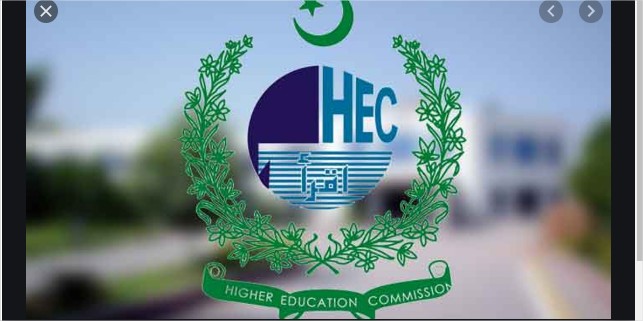HEC to introduce competency-based undergraduate education across Pakistan

DNA
Islamabad, July 14, 2020: Over the last 18 months, HEC has undertaken extensive consultations with over 1,000 individuals in 143 universities on measures needed to enhance student success. The consultations have led to the revamping of the undergraduate curriculum, and the introduction of “competency-based education” at all universities and affiliated colleges across Pakistan. Competencies are defined as combinations of knowledge, skills, behaviour, and interpersonal characteristics that enable individuals to succeed in their future life.
Several key meetings were organised in 2019, including two national dialogues, five regional consultations, and 10 thematic workshops. These involved 143 universities from across the country including AJK and GB, and over a thousand individuals, including Vice Chancellors/Rectors, faculty members from universities as well as colleges, college principals, Secretaries and other officials of higher education departments, and heads and officials of professional councils.
The Chairman HEC stated that the purpose of education is to enable students to succeed in their future life, not only in their jobs, but also in their social, political, and personal endeavours. Universities have to work in such a way as to maximise the probability of such success, especially through the undergraduate degree programme, which is the flagship of any higher education system. In practice, however, this has not been the case. A major reason is that very little attention has been given in the past to this question, and therefore to the substance and quality of university education.
He said that the new system is based explicitly on “competencies”, i.e., the determinants of future student success, and is designed to ensure that educational programmes orient themselves to the future needs of students. This shift will have long-lasting positive impacts on educational achievement and future success. The new system will be rolled out over the coming year, he added.
There are numerous and well known critiques of undergraduate education in Pakistan, especially from employers and admissions committees. The old curriculum does not provide Pakistani students with such essential 21st century skills as critical and creative thinking, problem-solving, effective communication, quantitative analysis, team building, or research methods. The new curriculum is designed specifically to enable the transmission of these skills as well as interpersonal and behavioural attributes. More importantly, the new curriculum focuses on applying the acquired knowledge and skills to life’s challenges, rather than merely acquiring theoretical knowledge. It emphasises exploration, curiosity, discovery, and creativity amongst students.
The academic component of the curriculum seeks to balance generalization and specialization. In earlier semesters, every student must complete General Education (GE) courses in the major domains of human knowledge, i.e., Arts and Humanities, Natural Sciences, Social Sciences, Quantitative Reasoning, and Expository Writing, in addition to Pakistan Studies and Islamic/Religious Studies. In subsequent semesters, the students will move towards required departmental courses in their areas of specialisation (also called “Majors”). This sequencing is meant to provide the students with flexibility in the choice of their area of specialisation. Students will also have the flexibility to graduate either with a single Major or a double Major, or a Major plus one or two Minors.
In order to respond to the concerns expressed by potential employers, the new curriculum has made practical experience a mandatory requirement for graduation. All students will have to complete a summer internship in an actual work environment. In addition, students will have to choose an additional real world life skill, e.g., entrepreneurship and business development, civic engagement and network building, or participation in sports and competitions, and register for corresponding extracurricular activities in business incubation centres (BICs), student clubs, green clubs, sports, or university magazines. Although the practical work will be evaluated and included in the students’ record, it will not have letter grades or formal credit requirements.
In other words, the objective is to equip students not only with the latest knowledge in their chosen fields of specialisation, but also with essential life skills, i.e., effective writing and communication, introduction to quantitative analysis,
This framework will apply to all undergraduate degrees, including the four-year Bachelor Studies degree (BS), the degrees in any of the professions (MBBS, B.E., LLB, and the like), as well as the two-year Associate Degree (AD). Some details may vary for the different types of degrees, but the structure will be the same.
As designed, the new undergraduate programmes will make it possible for students to switch between degree programmes. For example, an AD holders may apply for admission to a BS programme and receive a transfer of credits from their AD to the BS programme. Similarly, a student admitted to the BS programme may exit just with an AD after fulfilling the credit requirements for the shorter degree. Further, a student admitted to a professional degree programme may apply for transfer to a general degree programme, or vice versa, provided they meet the admissions criteria of the admitting institution. This will also determine how many of the earned course credits and completed practical experience hours can be transferred.
The quality of undergraduate education cannot be improved solely by revamping the curriculum. To improve quality, reforms are needed in at least the two closely associated areas, namely effective teaching and meaningful quality assurance. Work has already started on these activities in parallel with curriculum reform. The National Academy of Higher Education (NAHE) has been established to invest in effective teaching methods. The Quality Assurance Agency (QAA) is being revamped to streamline oversight of quality enhancement.
Partial support for the rolling out of the new undergraduate curriculum has been received from the World Bank-funded Higher Education Development in Pakistan (HEDP). The HEDP is a five-year project (2019/20 – 2023/24) being implemented by the HEC. It aims to support “research excellence in strategic sectors of the economy, improve teaching and learning, and strengthen governance in higher education”. The Postsecondary Education Reform Unit (PERU) of the HEC is taking the lead in improving the teaching and learning component of HEDP.
Related News

Gandapur says security withdrawn, KP govt denies claim
ISLAMABAD, FEB 24: Former Khyber Pakhtunkhwa (KP) chief minister Ali Amin Gandapur on Tuesday saidRead More

PM Shehbaz meets Qatari counterpart to boost ties
DOHA, FEB 24 /DNA/ – Prime Minister of Pakistan, Muhammad Shehbaz Sharif, during his officialRead More


Comments are Closed